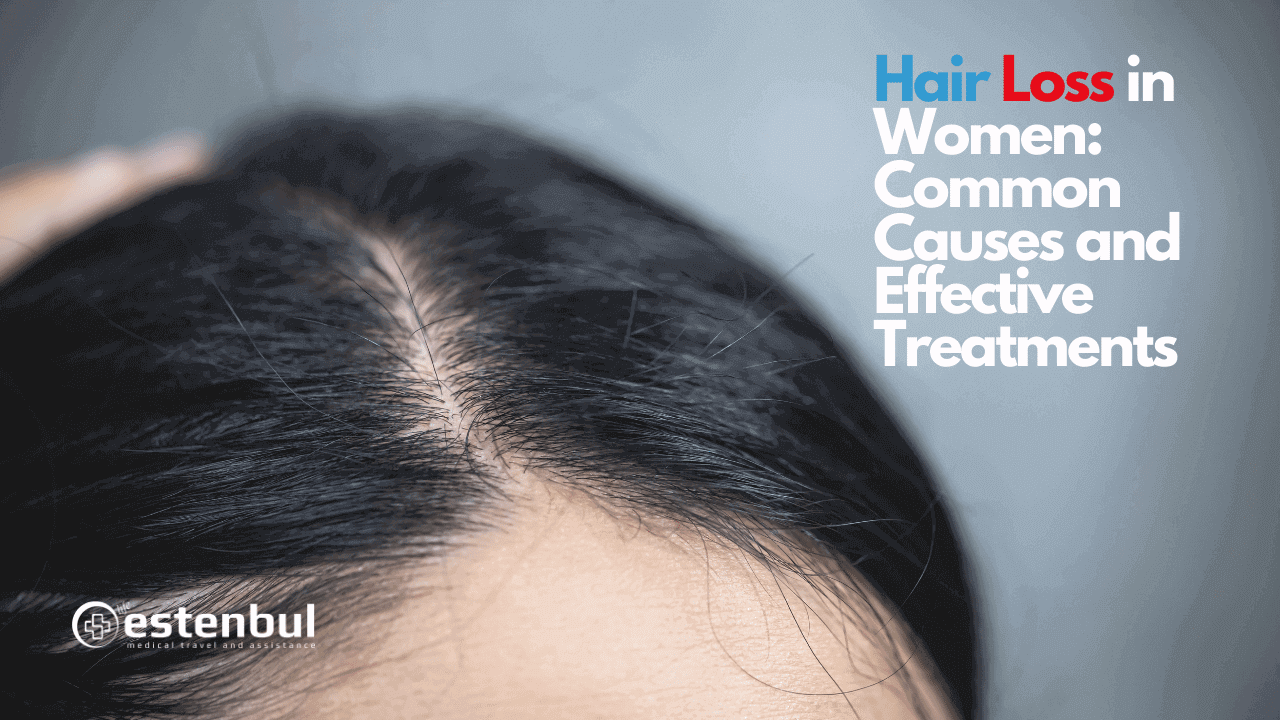Hair loss in women is a common problem that affects millions of women worldwide. Losing hair can be emotionally devastating, affecting a woman’s self-esteem, confidence, and quality of life. There are various causes of hair loss in women, and it is essential to understand them to determine the best course of treatment. In this article, we will discuss the common causes of hair loss in women, effective treatments, and tips to prevent hair loss.
Causes of Hair Loss in Women
Hormonal Imbalance
Hormonal imbalances, such as those caused by pregnancy, childbirth, menopause, and thyroid disorders, can lead to hair loss in women. The hormonal changes can disrupt the hair growth cycle, leading to excessive hair shedding.
Genetics
Hereditary hair loss, also known as androgenetic alopecia, is a common cause of hair loss in women. It is inherited from either the mother or father’s side of the family and can lead to thinning hair or bald patches.
Nutritional Deficiencies
Lack of essential nutrients, such as iron, zinc, vitamin D, and B vitamins, can lead to hair loss in women. A diet lacking in these nutrients can weaken the hair follicles, leading to hair shedding and thinning.
Stress
Stress can cause hair loss in women by disrupting the hair growth cycle. The physical and emotional stress caused by illness, surgery, or traumatic events can lead to excessive hair shedding.
Effective Treatments for Hair Loss in Women
Topical Treatments
Topical treatments, such as minoxidil and finasteride, are FDA-approved medications that have been proven effective in treating hair loss in women. Minoxidil is a topical solution applied to the scalp that stimulates hair growth, while finasteride is an oral medication that blocks the production of a hormone that causes hair loss.
Hair Transplant Surgery
Hair transplant surgery is a surgical procedure that involves transferring hair follicles from one area of the scalp to another. It is an effective treatment for women with hereditary hair loss, but it can be expensive and requires a skilled surgeon.
Platelet-Rich Plasma (PRP) Therapy
PRP therapy is a safe and effective treatment option for hair loss in women. By using a concentrated solution of a patient’s own platelets, PRP therapy can stimulate hair growth, improve hair density and thickness, and enhance the quality of existing hair.
PRP therapy can be used in conjunction with other hair loss treatments, such as topical treatments and low-level laser therapy, for maximum results. If you are experiencing hair loss, speak to a healthcare professional about whether PRP therapy may be right for you.
Nutritional Supplements
Nutritional supplements, such as biotin, iron, and vitamin D, can help improve hair health and prevent hair loss in women. Consult with a healthcare professional before taking any supplements.
Tips to Prevent Hair Loss in Women
Maintain a Healthy Diet
Eating a balanced diet that is rich in essential nutrients can help prevent hair loss in women. Include foods that are high in iron, zinc, vitamin D, and B vitamins in your diet.
Manage Stress
Managing stress can help prevent hair loss in women. Practice stress-reducing techniques, such as meditation, yoga, or deep breathing exercises.
Avoid Tight Hairstyles
Tight hairstyles, such as braids, ponytails, and buns, can pull on the hair and lead to hair loss in women. Avoid tight hairstyles and opt for loose, low-maintenance hairstyles.
Use Gentle Hair Products
Harsh hair products, such as those containing sulfates and parabens, can damage the hair and lead to hair loss in women. Use gentle hair products that are free from harmful chemicals and avoid over-styling your hair with hot tools.
Protect Your Hair from Heat
Excessive heat from hair dryers, curling irons, and flat irons can damage the hair and lead to hair loss in women. Use heat protectant sprays and avoid using hot tools frequently.
Seek Medical Advice
If you are experiencing excessive hair shedding or thinning, seek medical advice from a healthcare professional. They can help determine the underlying cause of your hair loss and recommend appropriate treatment options.
FAQs about Hair Loss in Women
Is hair loss in women normal?
Hair loss is a natural part of the hair growth cycle and is normal to some extent. However, excessive hair shedding or thinning can be a cause for concern and may indicate an underlying health condition.
Can hair loss in women be reversed?
Hair loss in women can be reversed with appropriate treatment options, such as topical treatments, hair transplant surgery, and low-level laser therapy. It is essential to seek medical advice to determine the best course of treatment for your specific condition.
Can stress cause hair loss in women?
Yes, stress can cause hair loss in women by disrupting the hair growth cycle. Managing stress through stress-reducing techniques can help prevent hair loss.
Can diet affect hair loss in women?
Yes, a diet lacking in essential nutrients, such as iron, zinc, vitamin D, and B vitamins, can lead to hair loss in women. Eating a balanced diet that is rich in these nutrients can help prevent hair loss.
Conclusion
Hair loss in women can be caused by several factors, including hormonal imbalances, genetics, nutritional deficiencies, and stress. Effective treatments for hair loss in women include topical treatments, hair transplant surgery, low-level laser therapy, and nutritional supplements.
Tips to prevent hair loss in women include maintaining a healthy diet, managing stress, avoiding tight hairstyles, using gentle hair products, protecting your hair from heat, and seeking medical advice. If you are experiencing excessive hair shedding or thinning, it is essential to seek medical advice to determine the underlying cause and appropriate treatment options.
With proper treatment and care, there is hope for women experiencing hair loss to regain their confidence and self-esteem.

